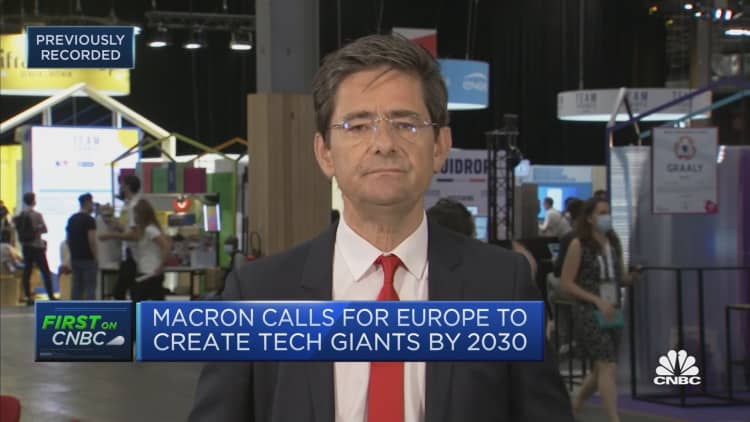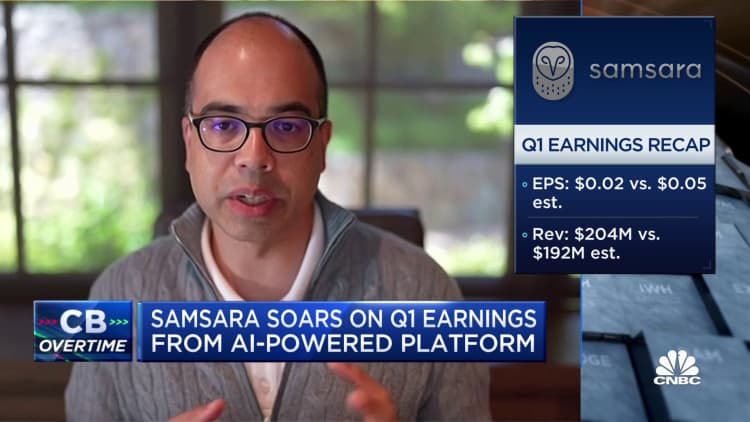Technology firms have come under huge strain over the last year and a half, with companies being pushed to prioritize profitability over growth at all costs as investors reevaluate the sector.
Malte Mueller | Fstop | Getty Images
Investment into European tech startups is set to fall another 39% this year, according to data from venture capital firm Atomico, as the pain in global tech continues.
Funding for Europe’s venture-backed startups is forecast to decline from $83 billion in 2022 to $51 billion in 2023, Atomico said.
That was largely down to a retreat from U.S. investors. American funds have previously been a significant driver of funding activity in Europe, and several notable VC funds in the U.S. have set up shop in London to increase their investments in the region.
The further drop in funding in Europe follows a brutal year for the technology industry last year — investment for private tech startups in Europe declined 22% to $83 billion in 2022 from $106 billion in 2021, Atomico.
The report is a scaled down, mid-year update from the London-headquartered fund, which has backed companies including Stripe, Klarna and Graphcore.
Atomico said there were some signs of “resilience” in Europe’s tech industry, including the fact that the overall value of public and private companies regained the $3 trillion mark it attained in 2021.
Meanwhile, early-stage firms have seen their funding reduced by less than their later stage counterparts, Atomico said, with funding for companies raising sub-$15 million round slipping to $8.2 billion in the first half of 2023, down from $10.3 billion in the same period a year ago.
Later stage firms are expected to account for 93% of the overall $28 billion loss in investment between 2022 and 2023, Atomico said.
Technology firms have come under huge strain over the last year-and-a-half, with companies being pushed to prioritize profitability over growth at all costs as investors reevaluate the sector.
Once richly-valued technology companies have seen their shares come under pressure from global factors, including Russia’s full-scale invasion of Ukraine and tighter monetary policy.
The Federal Reserve and other central banks have raised interest rates and pulled back on pandemic-era stimulus to stave off soaring inflation. That’s prompted investors to reassess their positions on lossmaking tech companies, whose values typically rest on the expectation of future cash flows.
Dark times remain
Last year, companies saw huge downward revisions to their share prices.
Swedish buy now, pay later giant Klarna slashed its valuation by 85% to $6.7 billion. Checkout.com reportedly cut the internal tax value of its shares by 15%, according to the startup media site Sifted.

Atomico said that the overall tech market in Europe has seen significant compression in valuation multiples.
The median enterprise value of public software-as-a-service companies now stands at about five times revenue, down from a long-term average of 7.8 times.
Atomico said that 20% of the venture rounds raised in the first quarter of 2023 were down rounds, 3.6 times higher than the same period a year ago.
Layoffs have also plagued the industry. In the first quarter, there were 11,100 layoffs in Europe, according to Atomico, accounting for about 6% of the global tech industry, which laid off 185,000 members of staff.
“It’s too early to say now whether that’s explicitly the peak,” Tom Wehmeier, partner at Atomico, told CNBC. “We would expect there to continue to be elevated levels of layoffs through 2023 beyond. It’s always part and parcel of the nature of market cycles.”
At the same time, more new companies are being started by teams composed of former tech unicorn employees than ever, with 1,406 new founders emerging from companies that were founded in the 2000s, Atomico said.
Sarah Guemouri, principal at Atomico, said it was too early to determine whether the layoffs over the past year have had any effect on the recycling of talent from unicorns into new companies.
Many founders who’ve been made redundant and started new companies have yet to update their LinkedIn profiles, for example.

It comes after a recent report from VC firm Accel said that tech unicorns in Europe and Israel are producing five times the number of startups, as the maturation of the continent’s tech ecosystem sparked a recycling of talent.
A.I. ‘supercycle’
Nevertheless, artificial intelligence proved something of a bright spot for the industry, with startups raising notable sums thanks to heightened investor buzz.
Generative AI startups accounted for 35% of the total investment into AI and machine learning firms last year, the highest share ever and a big jump from the 5% share they took up in 2023.
“We are in the early innings of what is a new AI supercycle technology,” Wehmeir said, adding that generative AI is driving a “huge degree of innovation” and that Europe “has a seat at the table.”
“What’s critical is that we create the type of environment that enables European talent to fulfil that potential of the next supercycle.”


